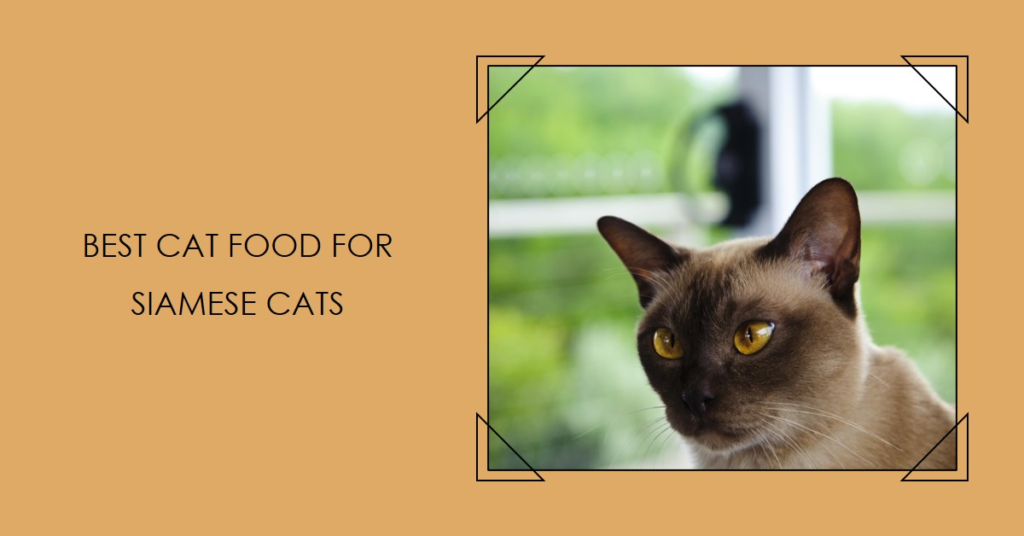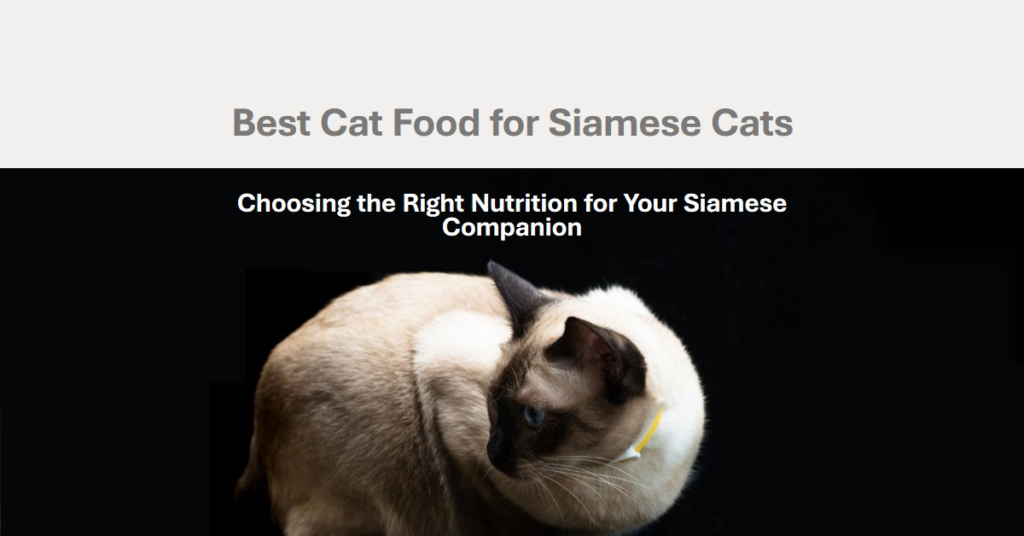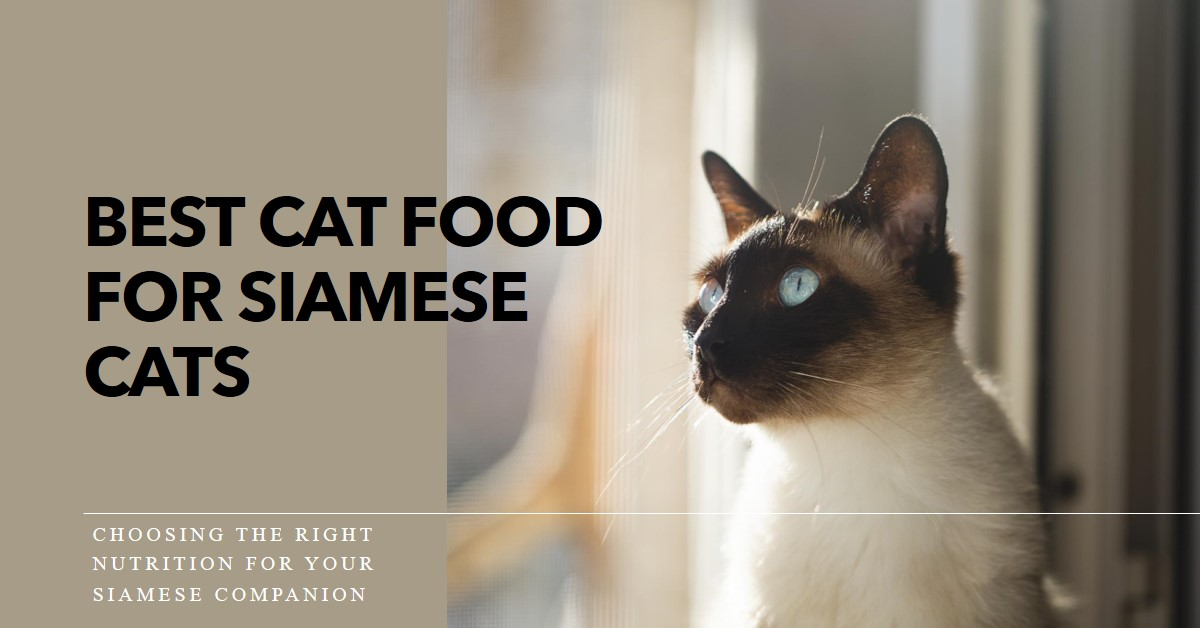Proper nutrition is essential for the health and happiness of Siamese cats. As one of the oldest defined breeds of domestic cats, the Siamese have distinct nutritional needs based on their heritage from Thailand’s tropical climate. We must carefully consider the specific dietary requirements for this breed, which is active, intelligent, and quite sensitive. Understanding these qualities will help us choose the best cat food for Siamese cats to support our beautiful Siamese companions positively. This article discusses the best cat food for indoor siamese. It looks at different wet and dry food types and recommends some top brands.
Wet vs. Dry Food
Wet food is often the best cat food for Siamese. It contains around 75% to 85% moisture content compared to dry food, which is only around 5% to 15%. This makes wet food more similar to a cat’s natural diet. Siamese cats originated from hot climates, so they naturally tend to stay hydrated. Wet cat food helps support this as cats get moisture from it. It also tends to be more digestible and ensures cats get proper nutrition. However, wet food must be refrigerated after opening and may not be practical for all cat owners.
Dry food is more convenient as it does not spoil easily and does not need refrigeration. They still provide reasonable nutrition, but extra water is needed. Look for high-protein dry cat foods under 12% to 15% carbs. Ensure the variety of ingredients and added vitamins/minerals. Some quality dry foods that could suit Siamese cats include Royal Canin Indoor, Hill’s Science Diet Indoor, and Purina Pro Plan Focus. But overall, wet food is probably a better choice as the main diet for most Siamese cats.

Top Wet Food Options
When it comes to wet food, some of the best cat food for siamese kittens include:
- Fancy Feast Classic Pate: It contains real chicken as the first ingredient. Cats love its texture and flavor. With 12 varieties, finding favorites is easy.
- Wellness Core Grain-Free: This line contains high-quality proteins and is grain-free. Options include turkey, chicken, and salmon flavors that most cats like.
- Merrick Backcountry: These cans/pouches provide nutrients from meat, fruit/veggies. With limited ingredients, cats easily digest and no artificial additives.
- Tiki Cat Instinct Natural: Each recipe uses whole meats/proteins as the first 5 ingredients. They contain supplements, too for complete and balanced nutrition.
- Applaws Nature’s Menu: Grain-free recipes come in gravy or pate textures. Cats love the fresh flavors, while owners appreciate the natural ingredients and high protein levels.
These offer variety while covering both homemade and commercial formulations. See which brand and flavors your Siamese cat enjoys best for a wet diet that meets their nutritional needs.
Top Dry Food Options
While wet food is ideal, here are some best food for siamese cats that are suitable:
- Royal Canin Breed Health Nutrition Siamese: Specifically designed for the breed with optimal protein levels and essential nutrients in a convenient dry kibble.
- Purina Pro Plan Focus Adult Sensitive Skin and Stomach: With a single protein source and prebiotic fiber for digestion, this gentler formula may agree with sensitive tummies.
- Hill’s Science Diet Indoor Adult: With real chicken as the first ingredient, it contains balanced levels of vitamins, minerals, and antioxidants for an indoor lifestyle.
- Wellness Core Original: Using high-quality proteins and limited ingredients without chicken/corn for a good general recipe.
- IAMS ProActive Health Adult: Providing complete nutrition from grains/proteins/produce while carefully monitoring nutritional levels throughout production.
These brands focus on whole meats, quality ingredients, proper nutrients and formulations customized for cats. They can fulfill Siamese cats’ nutritional needs while being convenient and digestible options for their distinctive natures. Consult a vet based on an individual cat’s needs.
Grain-Free vs Grain-Included Foods
Some cat owners believe grain-free diets are always best. However, this is a debated topic. Whole grains like corn, wheat, and soy are common allergens; many cats do well on quality foods containing moderate grains. Siamese cats have adapted to different traditional diets across regions, so moderate, high-quality grains may not pose issues. Grains also provide fiber, vitamins, and minerals. Foods from brands like Royal Canin and Hill’s Science Diet that contain grains can suit Siamese cats well if ingredients/formulas are of high quality with a proper grain-to-protein ratio.
On the other hand, the trend toward grain-free has some merits, too. These preserve proteins as the primary ingredient and avoid common allergens. Limited ingredient diets may suit cats with sensitive stomachs. Grain-free foods are worth trying under vet guidance if symptoms point to food intolerances. Overall, moderate grains in high-quality foods are acceptable for most Siamese cats, while grain-free can be preferred for those with known sensitivities. Quality should always take priority over any singular ingredient.
Importance of Proper Nutrition
Good nutrition is extremely important for the health and well-being of Siamese cats. As an ancient purebred, their bodies are genetically designed to maintain high energy levels as would be optimal for a hot climate. To do so, they need complete and balanced diets containing the right macros and micronutrients tailored to their needs.
Food supports their metabolism, digestion, organ functions, growth and development. Choosing the best cat food for Siamese cats ensures they receive protein, vitamins, minerals, fiber, and fatty acids for an active lifestyle and prolonged health span. Getting nutrition right is key for Siamese cats to avoid issues and reach their genetic potential lifespan indoors as human companions.

Protein Requirements
Being active, intelligent hunters by nature, Siamese cats require high-quality protein in their diets. Protein supports muscle growth, organ/tissue repairs, and overall wellness. Young cats need nutrient-dense foods of 25-35% protein for development, while adults maintain 18-25%. Whole meats like chicken, turkey, and fish are the main ingredients that best suit Siamese digestion.
Protein should not exceed limits as too much places strain on delicate systems. It must also come from named, easy-to-digest whole food sources. The best diets meet protein needs through minimally-processed whole foods rather than short-listed or by-products to nourish Siamese properly according to their heritage.
Gentle Digestion
Siamese cats are elegant but also quite sensitive. Their diminutive frames carry busy, active metabolisms requiring gentle yet nutrient-rich sustenance. Due to centuries of careful breeding, their digestive tracts can be quite delicate in processing certain ingredients. Choosing the best cat food for Siamese cats formulated for finicky temperaments is prudent.
Look for prebiotics, probiotics, and easy-to-digest carbohydrates paired with high-quality proteins. Diets with limited, identifiable ingredients cause fewer tummy troubles. Grain-free, hypoallergenic, or hydrolyzed protein varieties may benefit cats prone to digestive irritation. Selection revolves around textures and components the exotic Siamese digestive system better assimilates for optimal health.
Conclusion
Siamese require the best nutrition to remain healthy and energetic. Both wet and dry foods have merits, but wet varieties suiting digestive needs are preferable as the main diet. High protein levels and proper vitamins/minerals through whole meats and produce like chicken, turkey, fish, and other high-quality ingredients are priorities.
Brands like Royal Canin, Fancy Feast, Wellness, and Hills Science Diet offer options to meet this. Consult a vet, especially if sensitivities exist, to choose the best cat food for Siamese cats. With the right nourishment, these affectionate felines will surely thrive indoors as human companions.
Frequently Asked Questions
Q1. What protein sources are best?
Whole meats like chicken, turkey, and fish provide the high-quality protein Siamese need without complicating digestion. Protein should come from clearly-listed whole sources rather than vague by-products.
Q2. Should I avoid grains?
Moderate whole grains in high-end formulas pose little risk for most Siamese and add important nutrients. However, limited-ingredient diets may suit cats sensitive to common allergens like corn and wheat.
Q3. What about wet vs dry food?
Wet food provides moisture like their ancestral diets and tends to be gentler, though dry kibble remains an option with extra water. An occasional wet pate or broth also hydrates without replacing complete dry nutrition.
Q4. How much should I feed?
Amounts depend on age, size, and activity level, but 1/4 to 1/2 cups divided into 2 meals daily works well for most adult Siamese. Adjust up or down slightly based on individual body condition.
Q5. What supplements should I add?
Pureed pumpkin or bone broth provides fiber/moisture, while salmon oil adds omegas-3s and EPA/DHA. These supplements enhance nutrition with a balanced diet but aren’t replacements for whole-food nutrition.
Also Read:
- High Calorie Cat Food for Senior Cats: Keeping Your Feline Friend Healthy and Energetic
- Top Most Cat Food for Cats with No Teeth


